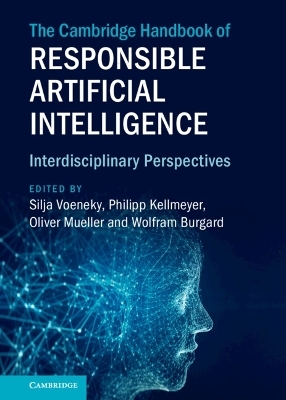
The Cambridge Handbook of Responsible Artificial Intelligence
Cambridge University Press (Verlag)
978-1-009-20786-7 (ISBN)
In the past decade, artificial intelligence (AI) has become a disruptive force around the world, offering enormous potential for innovation but also creating hazards and risks for individuals and the societies in which they live. This volume addresses the most pressing philosophical, ethical, legal, and societal challenges posed by AI. Contributors from different disciplines and sectors explore the foundational and normative aspects of responsible AI and provide a basis for a transdisciplinary approach to responsible AI. This work, which is designed to foster future discussions to develop proportional approaches to AI governance, will enable scholars, scientists, and other actors to identify normative frameworks for AI to allow societies, states, and the international community to unlock the potential for responsible innovation in this critical field. This book is also available as Open Access on Cambridge Core.
Silja Voeneky is a leading scholar in the field of the interdependence of ethics and public international law, and the governance of emerging technologies. She is Professor of Public International Law, and Comparative Law at the University of Freiburg and was a Fellow at Harvard Law School. She previously served as a member of the German Ethics Council. Since 2001, Voeneky has been, inter alia, a legal advisor to the German Federal Foreign Office, and the German Federal Ministry of Environment. She is an author and (co-)editor of several books, as S. Voeneky and G.L. Neuman (eds), Human Rights, Democracy, and Legitimacy in a World of Disorder (2018). Philipp Kellmeyer is a neurologist and neuroscientist at the University Medical Center Freiburg. In his neuroscientific work, he investigates language processing in the brain and the clinical application of brain-computer interfaces, virtual reality and other digital technologies. Through his contributions to neuroethics, he has become an international expert on ethical aspects of neuroscience, neurotechnology and AI. Oliver Mueller is Professor of Philosophy with a focus on technology and on contemporary philosophy, University of Freiburg and a Senior Fellow at the 2018–2021 FRIAS Saltus Research Group 'Responsible AI'. Wolfram Burgard is a leading researcher in Robotics and Artificial Intelligence. He co-authored more than 400 publications including the famous book 'Probabilistic Robotics'. He received numerous awards including the Gottfried Wilhelm Leibniz Prize, the most prestigious German research award and is Fellow of several societies.
Introduction; Part I. Foundations of Responsible AI: 1. Artificial Intelligence – Key Technologies and Opportunities Wolfram Burgard; 2. Automating Supervision of AI Delegates Jaan Tallinn and Richard Ngo; 3. Artificial Moral Agents – Conceptual Issues and Ethical Controversy Catrin Misselhorn;4. Risk Imposition by Artificial Agents – The Moral Proxy Problem Johanna Thoma; 5. Artificial Intelligence and its Integration into the Human Lifeworld Christoph Durt; Part II. Current and Future Approaches to AI Governance: 6. Artificial Intelligence and the Past, Present and Future of Democracy Mathias Risse; 7. The New Regulation of the European Union on Artificial Intelligence – Fuzzy Ethics Diffuse into Domestic Law and Sideline International Law Thomas Burri; 8. Fostering the Common Good – An Adaptive Approach Regulating High-Risk AI-Driven Products and Services Thorsten Schmidt and Silja Voeneky; 9. China's Normative Systems for Responsible AI – From Soft Law to Hard Law Weixing Shen and Yun Liu; 10. Towards a Global Artificial Intelligence Charter Thomas Metzinger; 11. Intellectual Debt – With Great Power Comes Great Ignorance Jonathan Zittrain; Part III. Responsible AI Liability Schemes: 12. Liability for Artificial Intelligence – The Need to Address both Safety Risks and Fundamental Rights Risks Christiane Wendehorst; 13. Forward to the Past – A Critical Evaluation of the European Approach to Artificial Intelligence in Private International Law Jan von Hein; Part IV. Fairness and Non-Discrimination in AI Systems: 14. Differences that Make a Difference – Computational Profiling and Fairness to Individuals Wilfried Hinsch; 15. Discriminatory AI and the Law – Legal Standards for Algorithmic Profiling Antje von Ungern-Sternberg; Part V. Responsible Data Governance: 16. Artificial Intelligence and the Right to Data Protection Ralf Poscher; 17. Artificial Intelligence as a Challenge for Data Protection Law – And Vice Versa Boris Paal; 18. Data Governance and Trust – Lessons from South Korean Experiences Coping with COVID-19 Haksoo Ko, Sangchul Park and Yong Lim; Part VI. Responsible Corporate Governance of AI Systems: 19. From Corporate Governance to Algorithm Governance – Artificial Intelligence as a Challenge for Corporations and their Executives Jan Lieder; 20. Autonomization and Antitrust – On the Construal of the Cartel Prohibition in the Light of Algorithmic Collusion Stefan Thomas; 21. Artificial Intelligence in Financial Services – New Risks and the Need for More Regulation? Matthias Paul; Part VII. Responsible AI Healthcare and Neurotechnology Governance: 22. Medical AI – Key Elements at the International Level Fruzsina Molnár-Gábor and Johanne Giesecke; 23. 'Hey Siri, How Am I Doing?' – Legal Challenges for Artificial Intelligence Alter Egos in Healthcare Christoph Kroenke; 24. Neurorights – A Human-Rights Based Approach for Governing Neurotechnologies Philipp Kellmeyer; 25. AI-Supported Brain-Computer Interfaces and the Emergence of 'Cyberbilities' Boris Essmann and Oliver Mueller; Part VIII. Responsible AI for Security Applications and in Armed Conflict: 26. Artificial Intelligence, Law and National Security Ebrahim Afsah; 27. Morally Repugnant Weaponry? Ethical Responses to the Prospect of Autonomous Weapons Alex Leveringhaus; 28. On 'Responsible AI' in War – Exploring Preconditions for Respecting International Law in Armed Conflict Dustin A. Lewis.
| Erscheinungsdatum | 08.11.2022 |
|---|---|
| Reihe/Serie | Cambridge Law Handbooks |
| Zusatzinfo | Worked examples or Exercises |
| Verlagsort | Cambridge |
| Sprache | englisch |
| Maße | 184 x 262 mm |
| Gewicht | 1170 g |
| Themenwelt | Informatik ► Theorie / Studium ► Künstliche Intelligenz / Robotik |
| Recht / Steuern ► EU / Internationales Recht | |
| Recht / Steuern ► Privatrecht / Bürgerliches Recht ► IT-Recht | |
| ISBN-10 | 1-009-20786-5 / 1009207865 |
| ISBN-13 | 978-1-009-20786-7 / 9781009207867 |
| Zustand | Neuware |
| Haben Sie eine Frage zum Produkt? |
aus dem Bereich


